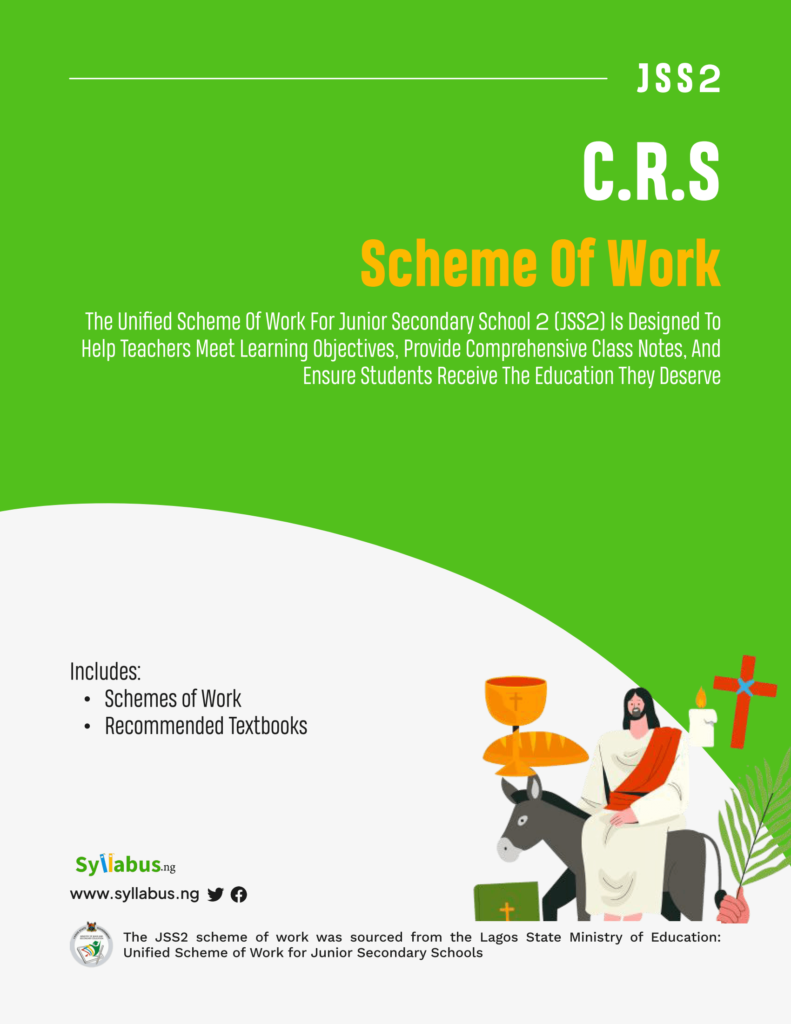JSS2 Christian Religious Studies (CRS) Scheme of Work
Download the Junior Secondary School 2 (JSS2) Unified Scheme of Work for Christian Religious Studies (CRS) to serve as a guide for educators

Home » JSS2 Scheme of Work » JSS2 Christian Religious Studies(CRS) Scheme of Work
Home » JSS2 Scheme of Work » JSS2 Christian Religious Studies(CRS) Scheme of WorkAbout JSS2 Christian Religious Studies (CRS) Scheme of Work
Christian Religious Studies (CRS) is a subject taught in Junior secondary schools where students learn about Christianity. It is the study of what Christians believe, how they worship, and how Christianity has affected society. It teaches several Bible stories, Christian traditions, and what is right and wrong according to Christian teachings.
The main aim of teaching CRS in Junior secondary schools is to help students understand the most important beliefs of Christianity and how they relate to different parts of life.
Christian Religious Studies is taught in Junior Secondary schools to give students a full understanding of Christianity as a religion, including its cultural, historical, and social aspects. It also teaches students to value tolerance, respect, and empathy for people from different religious backgrounds.
Assessment Guide
In junior secondary schools, how students are assessed in Christian Religious Studies can differ from school to school. However, typically, they are evaluated through tests or quizzes (Continuous Assessment Tests) and end-of-term exams.
Grading usually follows a scale from A to F, with A representing excellent performance, typically scoring around 70% or 80%, and F indicating failure, usually below 40%.
Download JSS2 CRS Scheme of Work

Know what’s expected of you as an educator
Download the Lagos State Unified Scheme of Work for JSS2 Christian Religious Studies(CRS)
JSS2 First Term Scheme of Work for Christian Religious Studies (CRS)
| LAGOS STATE MINISTRY OF EDUCATION: UNIFIED SCHEMES OF WORK FOR JUNIOR SECONDARY SCHOOL | ||
| Christian Religious Studies Scheme of Work for Junior Secondary School 2(JSS2) | ||
| Class | J.S.S 2 | |
| Subject | Christian Religious Studies | |
| Term | First Term | |
| Week | Topic | Breakdown |
| 1 | THE BIRTH OF JESUS | I. Narrate the Annunciation of the Birth II. Discuss the story of the birth of Jesus III. State the Importance of the visit by the Wise Man and their Gifts |
| 2 | PRESENTATION OF JESUS IN THE TEMPLE | I. Narrate the Prophesy of Simon and Anna (Luke 2:25 – 40) II. State the Significance of the Presentation of Jesus in the Temple |
| 3 | JESUS’ BAPTISM | I. Narrate the role of John as the fore – runner of Jesus (Matthew 3:13 – 17 and Mark 1:9 – 16) II. Narrate How Jesus was Baptized by John in the River Jordan and What happened during the Baptism (Mark 1:9 – 11 and Luke 3:21 – 22) III. State the. Significance of Jesus Baptism |
| 4 | THE TEMPTATION OF JESUS CHRIST | Matthew 4:1 – 11 I. Define Temptation II. Narrate the Story of the Temptation of Jesus Christ III. State the Moral Lessons of the Temptation of Jesus |
| 5 | CALL FOR DISCIPLES | I. Definition of Disciple II. Narrate the Call of the First Four Disciples ( Matthew 4:18 – 22 and Mark 1:14 – 20) III. List the Names of the Twelve Disciples IV. State the Demands for Disciples (Luke 5 :1 – 11, Mark 3:13 – 19, Matthew 8 : 18 – 22 and Luke 9:57 – 62) |
| 6 | JESUS MEETS SINNERS | I. Identify Jesus Merciful Lord to Sinners II. Narrate the Story of Zacchaeus Encounter with Jesus (Luke 19 : 1 – 10) III. State the Moral Lessons of the Encounter |
| 7 | THE BEATITUDES | Matthew 5:1 – 12 I. Definition of Beatitudes II. List the Beatitudes and Its Reward |
| 8 | CHRISTIANS AS LIGHT AND SALT OF THE WORLD | Matthew 5:13 – 15 I. Define Christians as Light and Salt of the World II. Recite Matthew 5:13 III. State the Moral Lessons of Light and Salt to the World |
| 9 | WORLDLY POSSESSIONS | Matthew 16:26 and Luke 16:11 I. State the Right Attitudes of Christians towards Earthly Possessions II. List Some Worldly Possessions III. State Jesus attitude to Worldly Possessions |
| 10-11 | REVISION | |
| 11-12 | EXAMINATION | |
JSS2 Second Term Scheme of Work for Christian Religious Studies (CRS)
| Term | Second Term | |
| Week | Topic | Breakdown |
| 1 | JESUS PARABLES | I. Definition of Parable II. Identify Types of Parables III. State Reasons for Using Parable by Jesus |
| 2 | TYPES OF PARABLES | I. Identify the Types of Kingdom Parables (Matthew 13:1 – 23 and Mark 4:1 – 20) II. State Examples of Each of the Parable Type III. Parable illustrating God’s Love (Luke 15:3 – 7 and Matthew 18 :12 – 24) IV. Parable illustrating for One Another |
| 3 | PARABLES OF THE KINGDOM | I. List the Types of Parables of the Kingdom • Parable of the sower (Matthew 13:1 – 23 and Mark 4:1 – 20) • Parable of the mustard Seed (Matthew 13:31 – 32, Mark 4:30 – 34 and Luke 13:18 – 19) • Parable of the wheat and Tares (Matthew 13:24 – 30 and 36 – 40) II. Narrate each of the Parable III. Interpret and State the Moral Lessons of Each of the Parable |
| 4 | PARABLES ILLUSTRATING GOD’S LOVE | I. Parable of the Lost sheep. LK 15: 3 – 7, Matt 18 : 12 – 24). II. The lost coin, LK. 15: 8 – 10. III. The prodigal son. LK. 15 : 11 – 32 IV. State the Moral Lessons of the Parables |
| 5 | PARABLES ILLUSTRATING CONCERN FOR ONE ANOTHER | I. List the parable illustrating concern for on another • Parable of the good Samaritan (Luke 10:15 – 37) • Lazarus and the rich man. (Luke 16:19 – 31) II. Narrate each of the parables III. State the moral lessons of each of the parables |
| 6 | MATURITY AND RESPONSIBILITY | I. List the Parables on the Maturity and Responsibility • The talents ( Matthew 25:14 – 30) • The virgins ( Matthew 25:1 – 13) • The Unforgiving Servant ( Matthew 28:21 – 33 ) II. Narrate Each of the Parables III. State the Moral Lessons of the Parables |
| 7 | JESUS CHRIST AND THE LAWS | I. Definition of Law II. State/List the Types of Law during Jesus Time (Civil and Religious Law) III. State how Jesus subjected Himself to the Laws of His Time. IV. Jesus Pay Tax (Luke 2:22 – 24, 41 – 51, Matthew 22:15 – 22, 17:24 – 27 and 19:16 – 22) |
| 8 | JESUS CHRIST AND THE LAWS | I. State some Jews and Religious Laws • The Observance of the Sabbath (Mark 2:23 – 28 and 3: 1 – 12) • The Practice of Corban, (Mark 7:9 – 13) II. State Jesus Attitudes and Reactions to the Jews Laws |
| 9 | JESUS CHRIST IMPROVES UPON THE LAW | Matthew 5:21 – 48 I. Murder (Matthew 5: 21 – 26), Adultery (Matthew 5:27 – 30), Swearing (Matthew 5:33 – 42), Retaliation (Matthew 5:38 – 42), Love of Enemies (Matthew 5:43 – 46) II. Differentiate between Civil and Religious Laws III. State the Attitude of Jesus towards Civil and Religious Laws |
| 10-11 | REVISION OF THE TERM’S WORK | |
| 12-13 | EXAMINATION |
JSS2 Third Term Scheme of Work for Christian Religious Studies (CRS)
| Term | Third term | |
| Week | Topic | Breakdown |
| 1 | REVISION OF SECOND TERM’S WORK | |
| 2 | THE PASSION OF CHRIST | I. Narrate the Story of the Triumphant Entry of Jesus (Matthew 21:1 – 12, 11 : 1 – 14 and Luke 19 : 29 – 44) II. List the Significance of the Triumphant Entry |
| 3 | THE CLEANING OF TEMPLE | Matthew 21:12 – 17 and John 2:12 – 21 I. Narrate the story of the cleaning of the temple II. State the moral lessons of the Cleansing of the temple. |
| 4 | THE LAST SUPPER | Mark 14:10 – 25 I. The Sacredness of the Last Supper (1 Corinthians 11:27 – 34) II. Narrate the Story of the Last Supper III. State the Significance of the Last Supper |
| 5 | THE BETRAYAL AND ARREST OF JESUS | Mark 14:26 – 52 I. Narrate the Story of the Arrest of Jesus in the Garden of Gethsemane II. State the Reactions of the Disciples to the Arrest III. List the Moral Lessons of the Arrest |
| 6 | THE DEATH AND BURIAL OF JESUS | I. Narrate the Story of Peter’s Denial (Luke 22:54 – 62) II. State Reasons for the Betrayal by Peter |
| 7 | THE TRIAL OF JESUS | Matthew 26:57 – 68, Mark 14:55 – 65 and Mark 22:63 – 71 I. Narrate the Story of the Trial of Jesus II. List the Allegations put against Jesus |
| 8 | THE CRUCIFIXION OF JESUS | Matthew 27:32 – 56, Mark 15:21 – 41, John 19:38 – 42 I. Narrate the Story of the Crucifixion of Jesus II. State the Importance of Christ’s Death |
| 9 | THE BURIAL OF JESUS CHRIST | Matthew 27:56 – 66, Mark 15:42 – 47, Luke 24:50 – 56, john 19:38 – 42 I. Narrate the Story the Burial of Jesus II. Outline the Role of Joseph of Arimathea in his Burial |
| 10 | THE GREAT COMMISSION | Matthew 28:19 – 20 and Mark 15:14 – 15 I. Definition of Great Commission II. Memorize the great commission III. State the Importance of the Great Commission |
| 11 | REVISION | |
| 12-13 | EXAMINATION |
Recommended Christian Religious Studies (CRS) Textbooks for Junior Secondary School 2
The following textbooks are recommended for Christian Religious Studies in J.S.S.2.
- Fundamental Christiana Religious Studies for Upper Basic Schools By Ilochie F.N Amaukwu P.O Okeke – Noble Resources Ltd.
- Religious and National Values/ Christian Religious Studies for Junior Secondary Schools By H.A Adigwe, R.I Arubalueze, E.I Alutu et al – Africana First Publishers Book House Trust.
- Pacific Christian Religious Studies for U.B. E Class 2 with workbook By Chris – Mario Umegbolu (PHD), G.E Ikwueze (Barr. Mrs) et al – Pacific Publishers Ltd in Association with Pacific Correspondence College & Press Ltd
- Christian Religious Knowledge for Junior Secondary Schools with workbook B John Chiakwelu – Mid-Field Publisher Ltd.
- Holy Bible (Revised Standard Version)
- Christian Religious Education and Moral Instruction for JSS Book. 2 – By TNO Quarcoopome Living as God’s Children (New Syllabus UBE).
All JSS2 Scheme of Work
Download JSS2 CRS Scheme of Work

Know what’s expected of you as an educator
Download the Lagos State Unified Scheme of Work for JSS2 Christian Religious Studies(CRS)











